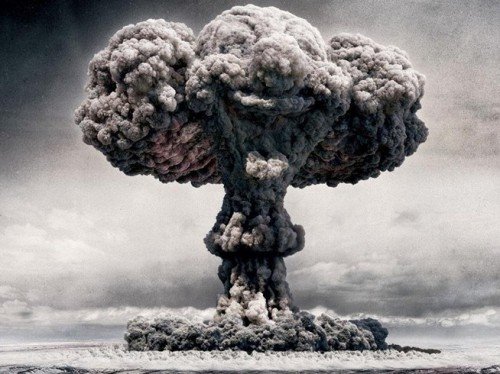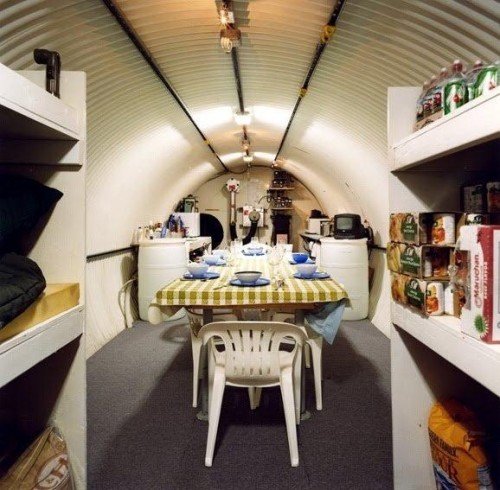
Whether the World will actually end or not, we will find out only on December 21. His scenario is also ambiguous, there are many options, everyone is preparing (if preparing) for the one that he considers the most likely.
And although I personally do not want to believe in any way that something terrible is waiting for us in just a couple of weeks, no, no, and the thought will flash: shouldn't we collect an emergency backpack just in case, in which there will be everything necessary to hold out for at least a week in the conditions of the apocalypse.
However, many people approach this issue much more seriously: they build arks or underground bunkers that are filled with provisions for a year ahead. This article discusses the scenario of the End of the World under the working title "Nuclear Catastrophe", it contains some useful tips in case you still decide to thoroughly prepare for X-Day. There is still time.
So, the Third World Nuclear War began. And what should you do?
First, you need to evaluate the place where you are at the moment. If it is very far from the supposed center of the explosion, then stay here and go to step two.
And if you already have a well-equipped bunker, why are you reading this article at all?!

When the alleged threat is in the immediate vicinity of you, then you need to run and very quickly. If you have a couple of days left, then plan everything correctly to reach a more or less safe place on time. There's nothing worse than getting stuck somewhere on the road. Analyze what obstacles may be waiting for you on the way to the chosen place of shelter, and correctly plot the route. This will allow you to hit the road at the right time and accurately calculate the amount of necessary supplies for the road.
After you decide on your place of stay, make sure that everyone in your group (you're not saving a life in proud solitude, are you?) they do their own thing. While someone is engaged in harvesting water and food, someone else has to work on the right equipment for housing, etc.
When preparing products, pay attention to those that are already ready for use: muesli, bars, dried fruits, canned food. You can take something perishable, but not too much. Preference should be given to products that will be stored for a long time:
Water is the most important thing. Take as much as you can put in your home. There will never be a lot of water, rather, there is always not enough of it.
Now about the essentials. Here the list will be more impressive:
The next step is to maintain the safety of the shelter.

No matter how dangerous radiation is, it decreases over time. A couple of days after a nuclear explosion, radioactive fallout will contain only 1/100 of the initial dose of gamma radiation. However, other types of radiation will be dangerous for a long time. And here's what to do:
Stay in the basement. If you have one, this is the best place to hide.
Strengthen the walls connecting your home to the outside world. Put anything: books, cabinets and other furniture. There should be an almost impenetrable wall between you and the outside world.
Any cracks in the house should be closed. Especially large ones can be pierced with rags or foam rubber, cover them with sealants, seal them with tape. Do not leave radioactive dust with a single chance to get into your house.
Get out like never before! Vacuum every day! Ten times a day! Before eating, wipe all kitchen utensils, cans of canned food.
There should be no dust in the house at all! it absorbs dangerous particles that you will inhale;
If there is an air conditioner in the house, it must be configured for recirculation. The air will be fresh and there will be no need for external ventilation.
If, despite all the measures taken, you still received a dose of radiation, then you need to do the following:
Escape from this place. If you received radiation in the shelter due to the fact that it was partially destroyed by an explosion, or because not all the cracks were closed, then you need to leave it immediately. If a small part of the house has been exposed to radiation, then carefully isolate it from the rest of the space.
Get rid of clothes that have been exposed to radiation. Seal it in a bag, throw it outside the house, burn it in the end.
Wash thoroughly with warm water. Very carefully. Rub the skin until it turns red. You don't want to infect your family, do you?
Take potassium iodide. It will reduce the symptoms of exposure and prevent the absorption of radioactive iodine by the thyroid gland.
Nuclear war, in fact, is not the worst scenario. Everything will be fine if you try not to panic, use common sense and stay indoors.
It will be difficult after the main consequences have passed. Life will never be the same: there will be a shortage of food and other things, banks, police, medical institutions, firefighters will probably not act for some time, many will have to radically change jobs, the value of money will change.
While you are going through the war in hiding, you need to think about how you will live after, how you will protect yourself and your loved ones, and you will have to stand up for yourself. War is a terrible, crazy event that makes even normal people a little crazy.
Unite with strong and strong-willed people who happened to be near you, in the same neighborhood or even in a house. Together you will be able to restore what was destroyed. Time will pass, and everything will get better one way or another, the main thing is not to give up and everything will be fine!
